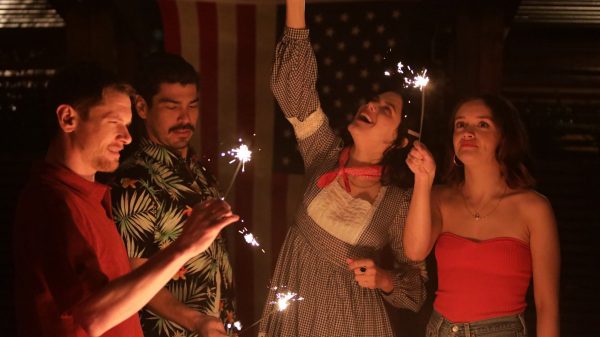Little Fish, 2020.
Directed by Chad Hartigan.
Starring Olivia Cooke, Jack O’Connell, Soko, Raul Castillo and David Lennon.
SYNOPSIS:
Emma (Olivia Cooke) and Jude (Jack O’Connell) are in love. Little Fish charts their relationship and speculates on the importance of memory in keeping them together.
Little Fish is a film created in flashback and grounded by two understated performances from Olivia Cooke and Jack O’Connell. Directed by Chad Hartigan, Little Fish is both character study, retrofitted rom com and philosophical fable with contemporary undertones.
Concise in cementing the central conceit of viral infection through memory loss, Little Fish taps into our fear of degenerative dementia. Structurally it comprises of interlinking memories experienced subjectively from multiple perspectives. Director Chad Hartigan first introduces fleeting moments of attraction between our two leads, then back tracks through recollections personalised in Polaroid pictures pinned to wallpaper. Through the use of in-camera effects and manipulated dialogue audiences experience this disease first hand, with partially obscured memories and muffled conversations shaping understanding. Both leads rely on glances and gestures rather than anything approaching exposition, although an ever-present internal monologue promotes emotional investment.
There are tangible links to the current situation with talk of grounded aircrafts, global lockdowns and YouTube remedies. In amongst the emotional turmoil which intentionally disorientates, medical subplots are introduced and news reports provide a coherent timeline. Emotional resonance is added incrementally as close friends, long term couples and family members succumb to the illness. In those moments Little Fish hits hardest as behaviour becomes erratic and individual disconnection most pronounced.
This premise embraces the idea of identity, while screenwriter Mattson Tomlin explores not only what brings people together, but also how characters cope without anything to anchor them. Relationships of one form or another give everyone structure. An emotional connection, common interest or chance encounter can be just as powerful as a bond made over an artform. By taking that away and stripping characters of their ability to build connections, Little Fish also explores the definition of purpose.
Intentionally or otherwise, Little Fish captures a mood which is prevalent around the world at present. With all the conventional means of interaction taken away people have had to adapt. Human contact, family connections and professional routines have been irreparably altered as COVID has changed the game. Beyond the economic fallout, there are now countless millions who feel lost as deadlines have been made redundant. With them came pressure, with pressure came purpose which in turn provided meaning.
For some, what defined them is no longer relevant, no longer necessary and what’s more no longer needed. Little Fish merely applies that state of being to a singular moment between two people, allowing audiences to experience the subtle stripping away of meaning. This small slice of social commentary effectively dissects that darkest fear without the need for attention seeking. By keeping events intentionally intimate, Little Fish is able to ignore the extraneous and offer up something with emotional impact worthy of discussion.
Flickering Myth Rating – Film: ★ ★ ★ ★ / Movie: ★ ★ ★ ★
Martin Carr















